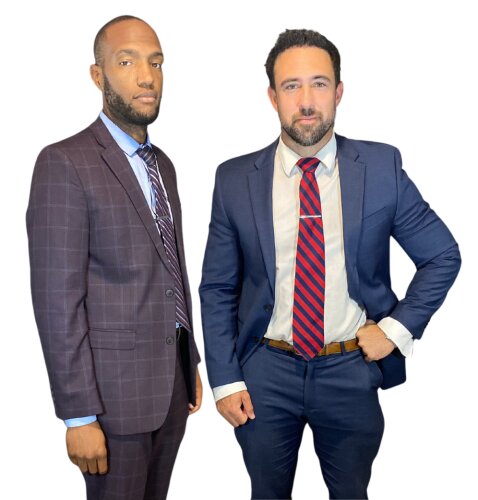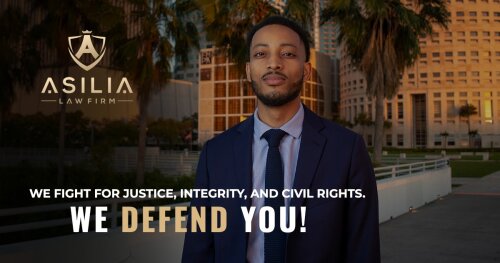Best Arrests & Searches Lawyers in Florida
Share your needs with us, get contacted by law firms.
Free. Takes 2 min.
Or refine your search by selecting a city:
List of the best lawyers in Florida, United States
About Arrests & Searches Law in Florida, United States
Arrests and searches are fundamental aspects of criminal procedure in Florida, designed to ensure that law enforcement acts within legal boundaries when detaining individuals or searching property. These laws are primarily shaped by both the United States Constitution and Florida's statutes, with the intent to balance public safety with individual rights. The Fourth Amendment of the U.S. Constitution, which protects against unreasonable searches and seizures, plays a crucial role, but Florida laws often provide additional specific procedures and requirements for law enforcement officers operating within the state.
Why You May Need a Lawyer
Legal guidance can be essential if you find yourself involved in a situation concerning arrests or searches. There are several scenarios where an attorney's expertise may prove invaluable:
- If you have been arrested and are unsure of your rights
- If law enforcement searched your home, vehicle, or person and you believe this may have been unlawful
- If evidence against you was obtained during a search and you want to challenge its use in court
- If you are being questioned by police in relation to a crime
- If you want to know whether you are required to consent to a search
- If you have been subject to an arrest warrant or believe a warrant has been issued
An attorney can help protect your constitutional rights, challenge the legality of police actions, and provide representation throughout the legal process.
Local Laws Overview
Arrests and searches in Florida are governed by both state and federal law, with specific procedures that law enforcement must follow to ensure actions are lawful.
- Probable Cause: Florida law requires law enforcement to have probable cause to arrest an individual. This means sufficient facts and evidence must support a reasonable belief that a crime has been committed by the person to be arrested.
- Warrants: Generally, police are required to obtain a warrant before making an arrest in a home or conducting a search of private property. Exceptions exist for exigent circumstances or when the evidence may be destroyed.
- Consent: You have the right to refuse a search unless police have a warrant or probable cause. If you consent, the search becomes lawful.
- Miranda Rights: Upon arrest, Florida law requires that you be informed of your rights to remain silent and have an attorney present during questioning.
- The Exclusionary Rule: Evidence obtained through unlawful searches and seizures may be excluded from being used in court against you.
- Stop and Frisk: Under the Florida Stop and Frisk Law, police may briefly stop and detain a person if there is reasonable suspicion of criminal activity, and frisk for weapons if there is a concern for officer safety.
Frequently Asked Questions
What is probable cause and why is it important?
Probable cause is a legal standard that means officers have sufficient facts to believe a crime has been committed. It is required for most arrests and searches to be valid in Florida.
Do police always need a warrant to search my home or car?
Generally, yes, but there are exceptions. Police may search without a warrant under circumstances such as consent, probable cause involving evidence in plain view, or emergencies where evidence may be destroyed.
Can I refuse a police search in Florida?
You have the right to refuse a search if police do not have a warrant or probable cause. If you give consent, the search becomes lawful.
What should I do if I am arrested in Florida?
Remain calm, do not resist, and ask for an attorney immediately. Exercise your right to remain silent until you have legal representation.
What are Miranda rights and when must they be given?
Miranda rights inform you of your right to remain silent and to have an attorney. Police must read you these rights before custodial interrogation.
What happens if evidence is obtained illegally?
If evidence is obtained through an unlawful search or arrest, your lawyer may be able to have it excluded from court under the exclusionary rule.
Can I be stopped and searched on the street?
Police may stop you if they have reasonable suspicion of criminal activity and may frisk you for weapons if they have concerns for safety, but the scope is limited.
Do I have to answer questions from the police?
Except for providing basic identification information if required, you have the right to remain silent and should request an attorney before answering questions.
What is a warrant and how do I know if one has been issued for me?
A warrant is a legal document authorizing an arrest or search, issued by a judge based on probable cause. You can check with the court clerk or through an attorney to determine if a warrant exists.
How can a lawyer help if I believe my rights were violated?
A lawyer can assess the legality of the police actions, challenge improper searches or arrests in court, and help protect your rights throughout the criminal process.
Additional Resources
For more information or assistance related to arrests and searches in Florida, consider these resources:
- Florida Bar Association - Offers lawyer referrals and information on legal issues
- Florida Department of Law Enforcement - Information on criminal records and procedures
- Local Public Defender’s Office - Provides legal assistance if you cannot afford a lawyer
- ACLU of Florida - Advocacy and educational materials on civil rights and police practices
- Your county court’s self-help center - Guidance on local rules and warrants
Next Steps
If you need legal assistance with an arrest or search in Florida:
- Do not discuss your case with law enforcement or others until you have spoken to a lawyer
- Contact a qualified Florida criminal defense attorney for a consultation
- If you cannot afford a lawyer, request a public defender at your first court appearance
- Gather all relevant documents, such as search warrants or arrest records, before your meeting
- Stay informed of your rights and responsibilities throughout the legal process
Taking prompt and informed action is vital to protect your rights if you are facing issues related to arrests and searches in Florida.
Lawzana helps you find the best lawyers and law firms in Florida through a curated and pre-screened list of qualified legal professionals. Our platform offers rankings and detailed profiles of attorneys and law firms, allowing you to compare based on practice areas, including Arrests & Searches, experience, and client feedback.
Each profile includes a description of the firm's areas of practice, client reviews, team members and partners, year of establishment, spoken languages, office locations, contact information, social media presence, and any published articles or resources. Most firms on our platform speak English and are experienced in both local and international legal matters.
Get a quote from top-rated law firms in Florida, United States — quickly, securely, and without unnecessary hassle.
Disclaimer:
The information provided on this page is for general informational purposes only and does not constitute legal advice. While we strive to ensure the accuracy and relevance of the content, legal information may change over time, and interpretations of the law can vary. You should always consult with a qualified legal professional for advice specific to your situation.
We disclaim all liability for actions taken or not taken based on the content of this page. If you believe any information is incorrect or outdated, please contact us, and we will review and update it where appropriate.
Browse arrests & searches law firms by city in Florida
Refine your search by selecting a city.














